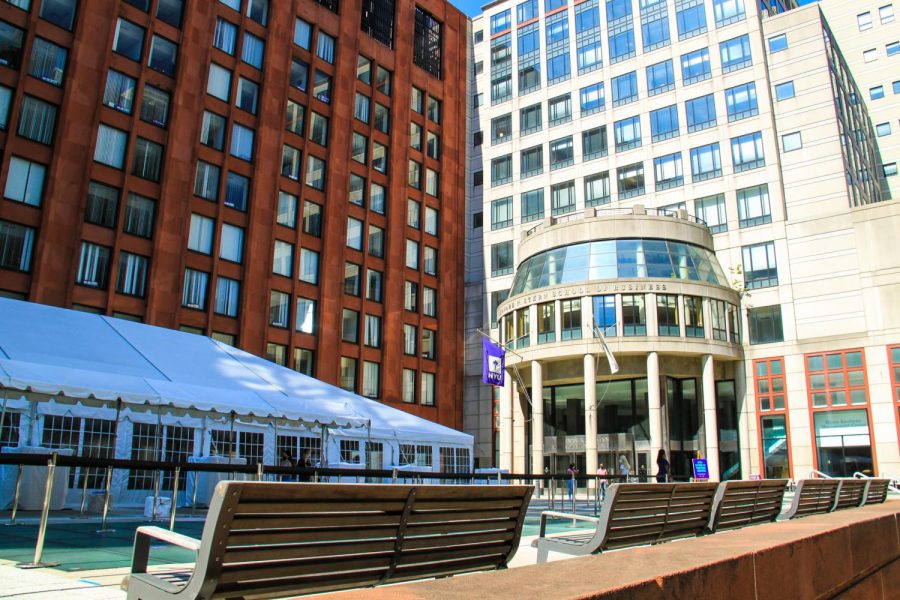NYU launched its Public Health Ambassadors program last month to aid students in comprehending and complying with NYU’s COVID-19 guidelines and to facilitate campus life during the COVID-19 crisis. Through the program, NYU has trained hundreds of undergraduate students to help their peers abide by state, city and university public-health guidelines.
Lara Fu, a second-year graduate student at Wagner, is one of the program’s graduate coordinators; in collaboration with other graduate coordinators, she oversees about 350 Public Health Ambassadors. Fu said that undergraduate PHAs are collectively working 2,500 hours per week across various NYU sites — Tandon School of Engineering in Brooklyn, Langone Health on First Avenue, the SPS Midtown center and the Washington Square Park campus.
Ambassadors are required to go through four rounds of training to equip them with the necessary skills to safeguard their health in potentially high-risk situations, Fu said. She confirmed that ambassadors were deployed at protest parties that took place in Washington Square Park on Sept. 12 and 13.
“Washington Square Park is public property so unfortunately NYU does not have jurisdiction over it,” Fu said. “But at the same time, it is right in the middle of basically what is NYU’s campus … That’s why the PHA program asked ambassadors if any of them were willing to staff at this time and this was just an opportunity for them to pick up extra shifts.”
“We never forced anyone into staffing it and of course we always emphasize to the ambassadors their safety is first and foremost,” Fu said.
WSN contacted all the ambassadors stationed at Washington Square Park during the protest parties, but was told to redirect all inquiries to University Spokesman John Beckman. The ambassadors feared termination of their employment if they spoke to WSN.
Yi Ping Bong, a second-year graduate student at Wagner, is also a PHA graduate coordinator. She said that she is confident in the program’s ability to help contain the spread of COVID-19, and she commended the University for the initiative.
“I feel that this program itself is a testament to how confident NYU is in protecting its students,” Bong said. “By making students work in the environment that [NYU is] getting other students to come to school in, you understand that the risk [NYU is] putting themselves in is going to be faced by the student workers themselves. So they definitely have equipped students and workers with the same level of PPEs and protection that they need.”
Pointing to the history and evidence of “community-based health promotion programs,” Dr. Cheryl Merzel, Director of Educational Advancement and Assessment at the School of Global Public Health, recommends the continued employment of PHAs.
“This is indeed a complex situation with no easy solutions,” Merzel wrote in an email to WSN, referring to the global pandemic, the hybrid semester, the protest parties and the quarantine of an entire dorm. “Student leadership is needed, and even then, behavior change will take time as attitudes and more importantly, norms are changed. These are the lessons from several decades of programs shown to be effective in reducing teen smoking and campus alcohol use, and in promoting adoption of safe sex behaviors.”
Merzel noted the effectiveness of peer role models; however, student ambassador roles should be solely educational, she said — “giving the ambassadors an enforcement role will damage trust.” Ambassadors alone are insufficient, Merzel added, and NYU needs a strong, student led–public information campaign. “Exhortations and warnings from University administration are of limited value,” she said.
Merzel also encouraged students to organize virtual town halls so that they can engage in dialogues with administrators about student issues and concerns regarding enforcement of public health and safety guidelines. Additionally, she recommended the university host socially distanced events as social outlets to prevent students from partying off campus or going to bars.
Referring to the Washington Square Park gatherings, Merzel emphasized the challenges associated with safely regulating the use of public spaces, especially regarding the ongoing Black Lives Matter protests.
“It appears that some of the activity is part of a protest and some is good old partying,” she wrote. “If protest leaders can be identified, I suggest that NYU student BLM leaders be asked to help broker safe protest situations with the protest organizers. The right to protest needs to be maintained but as many of us have observed, this can be done safely.”
Fu also believes that NYU’s ability to sustain an in-person experience is ultimately reliant on compliance across the university community.
“I feel pretty optimistic — but again, as I am sure NYU has emphasized, and as I am sure students are aware of, this is a group effort,” she said. “It really is dependent on all of us making this effort to practice our best public health behaviors and keeping our community healthy and safe.”
Email Aarushi Sharma at [email protected].
Correction, Sept. 17: A previous version of this article stated that Public Health Ambassadors work a collective 1,700 hours across all NYU campuses. Public Health Ambassadors work a collective 2,500 hours. The article has been updated and WSN regrets the error.


























































































































































